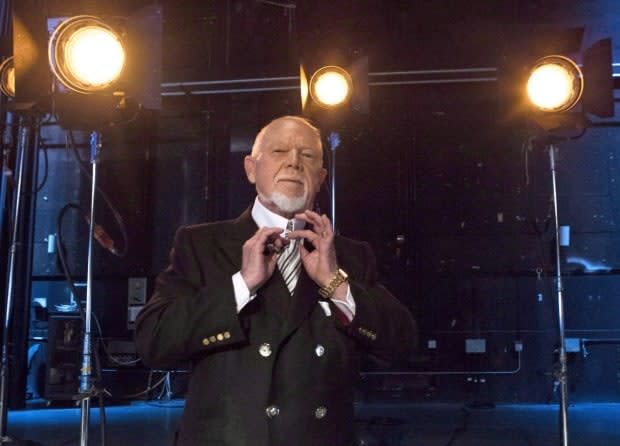CBC wrong to fire reporter who told news site he was forced to delete tweet critical of Don Cherry: arbitrator

CBC "acted improperly" by firing a reporter who leaked to a news site that the network forced him to take down a tweet criticizing broadcaster Don Cherry, an arbitrator has ruled.
Ahmar Khan, who worked in CBC's Manitoba newsroom as a temporary reporter/editor for a year before his termination in December 2019, is now entitled to be reinstated for a minimum of four months or receive four months of compensation, arbitrator Lorne Slotnick wrote in his ruling.
"His chosen method of publicizing an internal CBC decision ordering him to take down a tweet was, in my view, like other public comment from CBC employees, not intended to harm the CBC or its reputation, nor is there any evidence that it did so," Slotnick wrote.
CBC had said Khan was fired — not because of the tweet — but for both the leak and for homophobic and other disparaging remarks he was found to have posted on a private message group.
But Slotnick ruled those reasons "amounted to, at most, a minor indiscretion" and were "far overshadowed" by a breach of privacy that uncovered Khan's activities.
"Consequently, my conclusion is that the CBC acted improperly by dismissing him for cause," Slotnick wrote.
Khan declined to comment about the decision when contacted by email. He tweeted one word — "Vindicated" — early Wednesday.
Meanwhile, in a statement, CBC restated that its actions against Khan "were not related to his tweet regarding Don Cherry."
The network added: "As was noted in the ruling, our actions were not considered discriminatory and there was no breach of Human Rights law."
Cherry was fired in November 2019 after an outburst on Hockey Night in Canada in which the controversial commentator spoke about Remembrance Day and his outrage over "people that come here" — referring to immigrants — and don't wear poppies.
Khan was offended by Cherry's remarks and tweeted that his Coach's Corner segment should be cancelled. He said Cherry's "xenophobic comments being aired weekly are deplorable."
When CBC management learned of Khan's tweet, he was told it violated the policy on reporters expressing opinions, according to Slotnick's ruling.

Khan, who was 24 at the time, was asked to delete the tweet, which he did, reluctantly, and he wasn't disciplined for his actions, the decision says.
But Khan also told management that he believed CBC's policies were being applied selectively, and in a way that was harmful to journalists of colour, according to his testimony, which ran for seven days over several months last year.
He testified he wasn't satisfied with the answers he got from management and decided to leak what had transpired to the news site Canadaland, which published the story on Nov. 14.
Khan testified he was conflicted about telling Canadaland, but felt a discussion was necessary about race and the CBC and about how its journalism policies were, in his view, silencing employees of colour.
Later that November, another CBC reporter, Austin Grabish, using a shared company laptop that Khan had used, discovered Khan's personal Twitter and WhatsApp accounts were still logged in, and found messages that included an admission that Khan had contacted Canadaland.
"I noticed a WhatsApp screen that I was unfamiliar with and opened it," Grabish said in a statement to CBC on Thursday. "I was shocked and disappointed to see both a thread of misinformation about the CBC and several homophobic messages.
"As a gay man, I know what it's like to be marginalized and grew up repeatedly being the subject of regular homophobic slurs and bullying because of my sexual orientation."
However, Slotnick found that Grabish had conducted a search of Khan's WhatsApp account to find some of these messages.
In another message, Khan referred to management as "assholes" for accusing him of violating CBC journalist policies.

Khan had also sent a message to Andray Domise, a columnist with Maclean's magazine, who subsequently posted a tweet saying that CBC had made Khan take down the original tweet.
Grabish relayed what he found to management, who took screenshots of some of the messages. Khan was fired on Dec. 3, 2019, in part, according to the decision, for "contacting external outlets about the order to delete the Cherry tweet, and for making disparaging comments about CBC management and its policies."
He was also cited for making a homophobic slur on WhatsApp where his profile identified him as a CBC employee, says the ruling.
Khan testified the alleged slurs were a joke among friends, according to the ruling, and reiterated that position Thursday in an email to CBC.
"A friend and I were mocking a friend who uses that word in an effort to tell him to not use that language as it's derogatory and hurtful," he wrote in reference to the homophobic slur cited by Grabish.
Grievance filed
The union representing Khan, the Canadian Media Guild (CMG), filed a grievance on his behalf, alleging the CBC violated the collective agreement, the Canada Labour Code, the Privacy Act, the Canadian Human Rights Act and the Charter of Rights and Freedoms.
It argued Khan had a reasonable expectation that his messages, even though they were on a company laptop, were private and that they should not have been used by management in the decision to fire him.
The union also claimed that Khan was not seeking vengeance or to embarrass someone, but was calling for a public discussion about CBC's journalism policies and how they were silencing employees of colour.
In his ruling, Slotnick said Khan had a reasonable expectation of privacy for his messages and that his right to privacy was violated, which "tainted the entire process that led to the termination of his employment."
He said it was clear that Grabish could not have found what he did without conducting a search and that any suggestion that all the messages were on the screen when Grabish opened the laptop defies logic, given that some of them were months old.
Slotnick also said he agreed with the union that "if employees could lose their jobs for privately criticizing their bosses — even if in crude terms — this country would be facing a severe labour shortage."
WATCH | Cherry says he regets choice of words:
He also rejected the notion that the CBC's reputation had suffered.
"In an institution and an atmosphere where controversy is inherent in the nature of the product, my view is that it is an unfounded leap of logic to suggest that Mr. Khan's actions regarding a tweet somehow affected the CBC's reputation," he wrote.
Kim Trynacity, CBC branch president of the CMG, said the union is extremely pleased with the ruling, which "upheld the reasonable expectation of personal privacy" for employees.
"In trying to settle this grievance, it must be noted CMG has always focused on how management treated Khan, and how it dealt with a situation of a racialized temporary employee," she said in a statement.
"Management failed to respect Khan's reasonable expectation of privacy which is a clear violation under our collective agreement."

